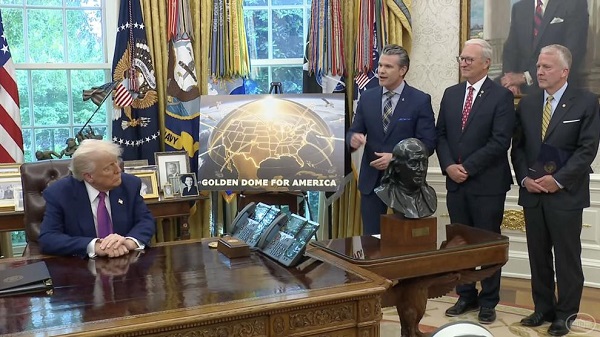From The Center Square
The Trump administration is moving forward with his Golden Dome missile defense system that is similar to Israel’s.
The administration has selected an architecture firm for the advanced missile-defense system, and Trump’s “big, beautiful” budget bill before Congress has allotted $25 billion for its initial construction. President Donald Trump said Tuesday the dome would cost about $175 billion in total and would be completed before the end of his term.
“We will have the best system ever built. As you know, we helped Israel with theirs, and it was very successful, and now we have technology that’s even far-advanced from that,” Trump said.
The president signed an executive order in January calling for the construction of a missile-defense dome for the U.S. similar to Israel’s Iron Dome. The order cited “threat of attack by ballistic, hypersonic, and cruise missiles, and other advanced aerial attacks” as the “most catastrophic” potential threat to the U.S. today.
Trump said the entire system would be built in the U.S. He also said that Canada, which wants missile protection, would help pay for it.
U.S. Secretary of Defense Pete Hegseth joined Trump for the announcement, calling the dome a “gamechanger” and crediting Trump for leading the charge on the project.
“It’s a generational investment in the security of America and Americans,” Hegseth said. “You’re following through to say, we will protect the homeland from cruise missiles, ballistic missiles, hypersonic missiles, drones, whether they’re conventional or nuclear.”
Once completed, the dome should be able to intercept missiles or weaponry launched from across the world or from space, the president said. Multiple times during the announcement, those speaking hearkened back to President Ronald Reagan, who originally had the vision for a missile defense system that, like a shield, would protect America from nuclear missiles.
“We will truly be completing the job that President Reagan started 40 years ago, forever ending the missile threat to the American homeland,” Trump said.
The president also announced that the administration had selected the man to lead the project. Gen. Michael Guetlein, Vice Chief of Space Operations for the U.S. Space Force, the fourth branch of the military created under Trump in 2019.
Trump said Guetlein has an “unmatched background in missile warning technology and defense procurement.”
“No one was more qualified for this job… This was a universal acceptance of General Guetlein. Everyone that knows him and knows everybody else said there’s only one man for the job, so I have the feeling we have the right guy.”



















